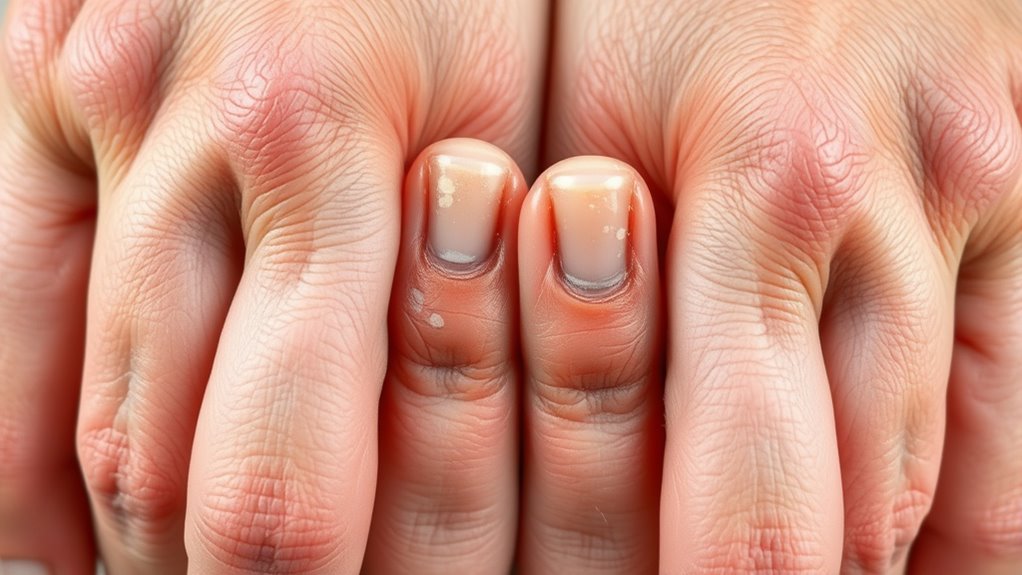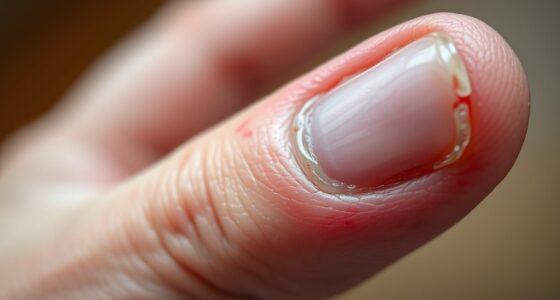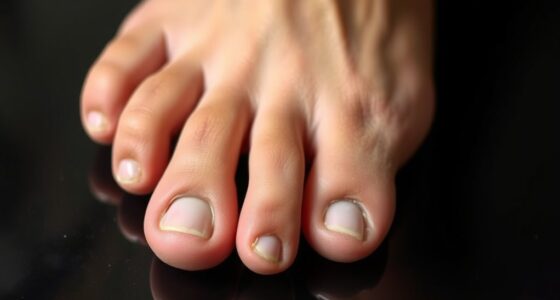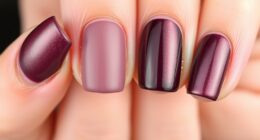To manage nail psoriasis and improve your nail appearance, focus on good hygiene by keeping nails clean and dry, gently trimming, and moisturizing regularly. Avoid harsh chemicals and wear gloves during chores to protect your nails. Natural remedies like soaking in warm water with tea tree oil or Epsom salts can soothe irritation. Consistency and gentle care are key, and sticking to these habits can make a difference—there’s more insight to help you get better results.
Key Takeaways
- Maintain proper nail hygiene by keeping nails clean, dry, and gently trimmed to prevent infections and damage.
- Use natural remedies like soaking in warm water with tea tree oil or Epsom salts to reduce inflammation and promote healing.
- Avoid harsh chemicals and irritants by choosing non-toxic nail products and wearing gloves during household chores.
- Support nail health through a balanced diet, stress management, and incorporating anti-inflammatory foods.
- Follow a consistent nail care routine with gentle handling, protection, and patience to gradually improve nail appearance.
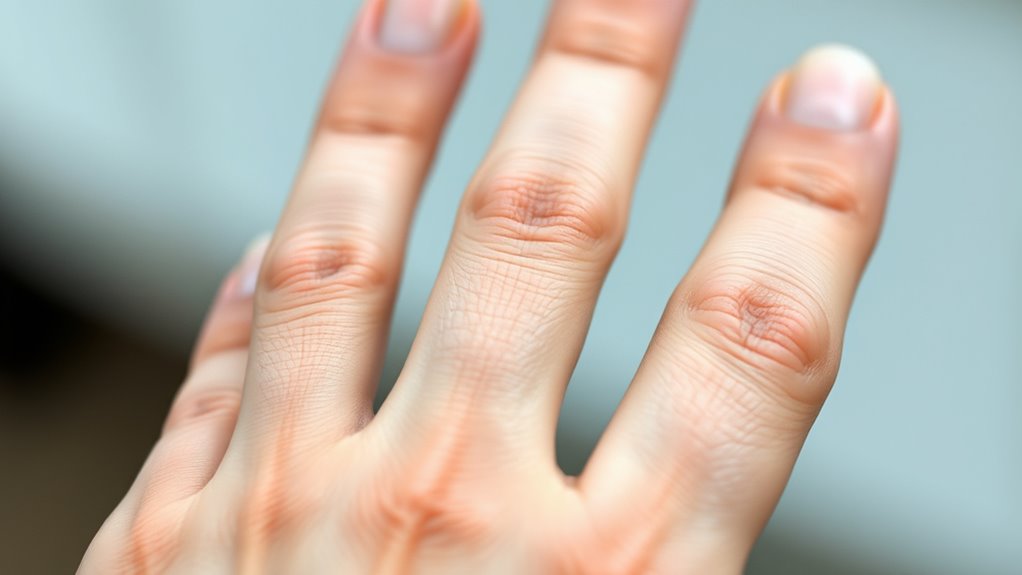
Nail psoriasis can be a challenging condition to manage, but with the right care, you can reduce symptoms and improve the appearance of your nails. One of the most important steps you can take is maintaining good nail hygiene. Keeping your nails clean and dry helps prevent infection and minimizes irritation. Gently trimming your nails with clean, sharp scissors or clippers can reduce the risk of further damage. Avoid biting or picking at your nails, as this can worsen the condition and lead to infections. Using a soft nail brush to clean under your nails can help remove debris and prevent buildup, which often exacerbates psoriasis symptoms. Regularly moisturizing your nails and cuticles with thick, fragrance-free creams or oils can help maintain flexibility and prevent cracking or splitting.
Maintaining good nail hygiene is key to managing nail psoriasis effectively.
In addition to proper nail hygiene, exploring natural remedies may offer relief and support healing. Soaking your nails in warm water mixed with soothing ingredients like tea tree oil, apple cider vinegar, or Epsom salts can reduce inflammation and soften the nails. Tea tree oil, for example, has antifungal and anti-inflammatory properties, which may help decrease redness and scaling. Apple cider vinegar, diluted with water, can restore the skin’s natural pH balance, reducing bacterial growth and irritation. Epsom salts are known for their calming effects and can help reduce swelling and soreness. Applying natural remedies consistently, but carefully, can complement your overall nail care routine and potentially lessen some symptoms.
Avoid harsh nail products, such as acetone-based polish removers, as they can strip moisture and worsen nail brittleness. When choosing nail polish, opt for non-toxic, hypoallergenic formulas to minimize exposure to chemicals that could trigger flare-ups. Wearing gloves during household chores or when using cleaning products provides additional protection from irritants and chemicals that may aggravate your nails.
You should also pay attention to your overall health, as systemic factors can influence nail psoriasis. Eating a balanced diet rich in anti-inflammatory foods, such as fruits, vegetables, and omega-3 fatty acids, supports skin and nail health. Managing stress through relaxation techniques can also help reduce flare-ups, as stress is known to trigger or worsen psoriasis symptoms.
Additionally, staying informed about new treatments and latest research can help you make better decisions about managing your condition. Ultimately, combining good nail hygiene, natural remedies, and protective measures creates a *thorough* approach to managing nail psoriasis. While it may take time to see significant improvements, consistency is key. By caring for your nails gently and avoiding irritants, you give yourself the best chance to reduce symptoms and restore a healthier appearance.
Frequently Asked Questions
Can Nail Psoriasis Be Completely Cured?
You wonder if nail psoriasis can be completely cured. While there’s no permanent cure, you can effectively manage your nail health by identifying and avoiding psoriasis triggers. Treatments like topical medications and phototherapy help improve appearance and reduce symptoms. Staying consistent with your care plan and avoiding triggers can considerably enhance your nail health, making nail psoriasis more manageable, even if it doesn’t disappear entirely.
Are There Natural Remedies for Nail Psoriasis?
Think of natural remedies as gentle rain nourishing a garden. While herbal treatments and dietary adjustments won’t erase nail psoriasis completely, they can soothe symptoms and support your overall health. You might try anti-inflammatory herbs like turmeric or incorporate omega-3-rich foods. Remember, consistency is key—these natural methods work best when combined with medical advice, helping you take a proactive step toward healthier nails.
How Does Nail Psoriasis Affect Daily Activities?
Nail psoriasis can considerably affect your daily activities by causing discomfort and nail damage. You might find it challenging to perform tasks that require fine motor skills or grip, as nail changes and pain interfere with daily routines. Maintaining good nail hygiene helps reduce infection risks, but you’ll also experience daily discomfort that can limit your productivity and enjoyment. Managing symptoms with proper care can help improve your overall quality of life.
What Are the Latest Advancements in Treatment Options?
Think of treatment options like a toolbox—today’s tools are more effective than ever. You might explore laser therapy, which targets nail inflammation directly, or biologic drugs that block immune responses causing psoriasis. These advancements offer promising relief, often with fewer side effects. Staying informed about these options helps you take control of your nail health, giving you a brighter outlook and renewed confidence in managing your condition.
Is Nail Psoriasis Contagious or Hereditary?
Nail psoriasis isn’t contagious; it’s caused by genetic factors and immune system issues, so you can’t catch it from someone else. Contagion myths often lead to misunderstandings, but there’s no risk of transmission through contact. If you have a family history, you’re more likely to develop it, but proper management can improve your nail appearance and quality of life. Rest assured, it’s a hereditary condition, not a contagion.
Conclusion
With patience and consistent care, you can turn your nail psoriasis journey into a chapter of resilience. Think of your nails as delicate gardens; with gentle tending and the right treatments, they can bloom anew, revealing their true beauty beneath the scars. Remember, every small step is a brushstroke in restoring your confidence. Embrace the process, and watch as your nails transform from rough terrain into a polished affirmation of your strength and perseverance.
